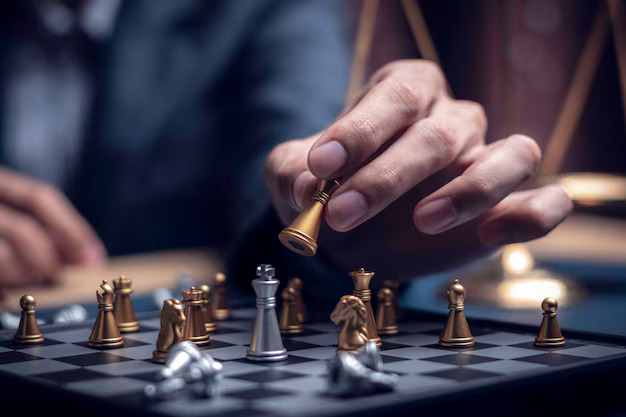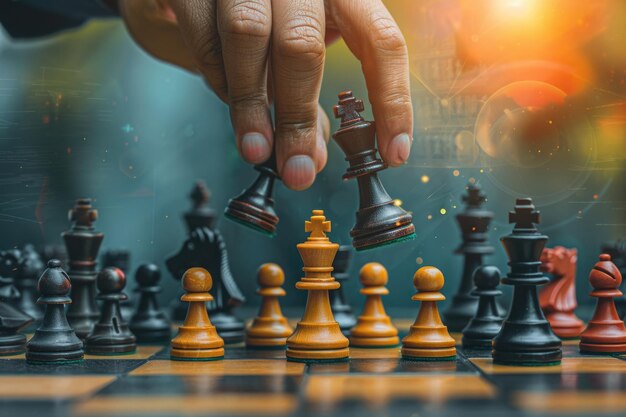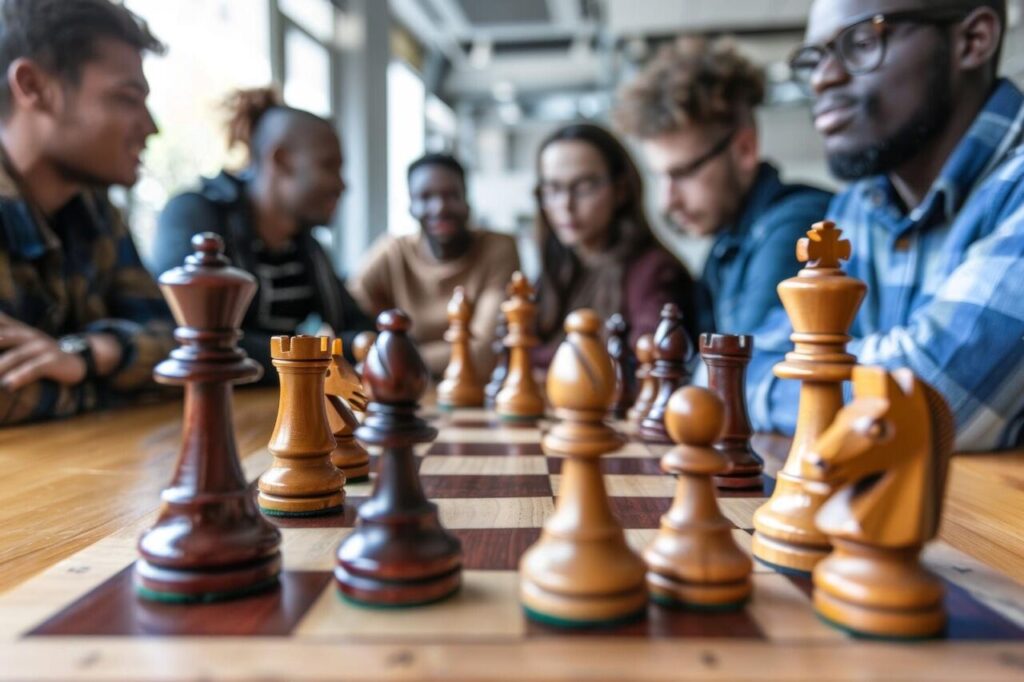Chess has always been more than just a game. It’s a test of strategy, patience, and the ability to make decisions. But what many people don’t realize is how much chess can help improve decision-making skills in real life. Whether you’re dealing with a work problem, making a big life choice, or trying to plan for the future, chess can teach you valuable lessons about how to approach problems and make smart decisions.
The Connection Between Chess and Decision-Making
Every move in chess is a decision. It’s a decision based on the current position, your future strategy, and what you think your opponent might do next.
Chess forces you to consider multiple possibilities at every step, teaching you to think critically and choose the best option. It’s like a mental workout, training your brain to evaluate different choices quickly and effectively.
Thinking Several Steps Ahead
In chess, one of the first skills players learn is how to think ahead. You can’t just think about your next move—you have to think about how your opponent will respond, and then what you’ll do after that.
This is a habit that becomes second nature the more you play. The same is true in life. When you’re making decisions, whether it’s choosing a career path, planning your day, or even handling a conflict, the ability to think ahead and plan for the future is incredibly valuable.
Chess trains you to constantly consider the consequences of your actions. In life, this means you’re less likely to make impulsive decisions. Instead, you take the time to consider how your choices might impact your long-term goals, and you make smarter, more thoughtful decisions as a result.
Learning from Mistakes
In chess, everyone makes mistakes. Even top players lose games or misjudge a position. But the key is that every mistake is an opportunity to learn.
After a game, chess players often review their moves to see where they went wrong and how they can improve next time.
This constant process of learning from mistakes is one of the most powerful aspects of chess, and it’s also a critical part of improving decision-making in life.
In the real world, mistakes happen all the time. Whether it’s a failed project at work, a misunderstanding in a relationship, or a personal setback, how you respond to those mistakes can determine your future success.
Chess teaches you not to dwell on failures but to analyze them, understand what went wrong, and apply those lessons moving forward.
Problem-Solving: The Core of Chess and Life
At its heart, chess is all about solving problems. Every time you face your opponent, you’re presented with a new challenge. How do you protect your king?
How do you capture their pieces while defending your own? These are complex problems that require both short-term tactics and long-term strategy. The great thing about chess is that, while it’s challenging, it’s also incredibly structured, which makes it the perfect tool for building strong problem-solving skills.
Breaking Down Complex Problems
One of the biggest advantages of chess is how it teaches you to break down complex problems into smaller, more manageable pieces.
A chessboard, with its 64 squares and 32 pieces, might seem overwhelming at first, but experienced players learn to focus on one area of the board at a time. You don’t need to solve the entire game at once—you just need to figure out the next best move.
This way of thinking is useful in everyday life. Often, when we’re faced with a big problem—whether it’s a difficult project at work or a personal challenge—it can feel overwhelming.
Chess teaches you to break the problem into smaller parts, to tackle each one step-by-step, and gradually work towards a solution. By focusing on the immediate decisions you can make right now, you’re less likely to feel overwhelmed by the bigger picture.
Evaluating Multiple Solutions
In chess, there are always several possible moves you could make at any given moment. Some might lead to a quick advantage, while others might set you up for a stronger position down the line.
The trick is evaluating each option and deciding which one gives you the best chance of success. Chess forces you to weigh the pros and cons of every possible move.
This habit of evaluating multiple solutions is invaluable in real life. When you’re faced with a tough decision—whether it’s choosing between job offers, deciding how to spend your money, or figuring out how to resolve a personal conflict—being able to weigh different options is critical.
Chess trains you to think in this structured way, so when it comes time to make decisions in real life, you already have the tools to evaluate your choices carefully.
Strategic Thinking for Long-Term Success
One of the biggest lessons chess teaches is the importance of strategy. In chess, your success isn’t just about what happens in the next move—it’s about what happens over the course of the entire game.
You might sacrifice a piece now to gain a stronger position later. This kind of long-term thinking is crucial, not just in chess, but in every area of life.
Delayed Gratification and Patience
Chess teaches the value of patience. Often, the best strategy in chess involves waiting, setting up your position carefully, and only making a move when the time is right.
It’s easy to get impatient and rush into a move that looks good at first glance, but experienced players know that long-term success often requires waiting for the right opportunity.
This lesson in patience is directly transferable to real-life decision-making. In many areas of life, whether it’s investing money, building a career, or even personal relationships, success often comes from delayed gratification.
Chess helps develop the mindset of waiting for the right moment, instead of jumping into quick decisions that might feel good in the short term but hurt you in the long run.
Seeing the Big Picture
In chess, focusing too much on small, immediate gains can lead to failure.
You need to keep the bigger picture in mind—the overall position of your pieces, your long-term strategy, and how each move fits into that strategy. Chess constantly reminds you to think beyond the present moment.
In real life, this lesson is crucial. Whether it’s managing a long-term project at work, planning for your financial future, or working toward personal goals, keeping the big picture in mind helps you stay focused and make better decisions.
Chess trains you to look at the whole landscape of a situation, not just the immediate gains or losses.
Chess Teaches Emotional Control
Chess requires not just mental skill but emotional control. A bad move or an unexpected loss can easily cause frustration, but chess players quickly learn to manage their emotions.
Staying calm and composed is essential for making clear, logical decisions.
Handling Stress and Pressure
In chess, particularly in competitive games, the pressure can build as the game reaches its climax. The ability to stay focused under pressure, to think clearly even when the stakes are high, is a skill that transfers easily to real life.
Bouncing Back from Setbacks
Everyone makes mistakes in chess. The key is learning from those mistakes without letting them shake your confidence.
This ability to bounce back from setbacks with a positive attitude is essential in life, helping you to keep moving forward no matter the obstacles.
Chess Promotes Confidence in Decision-Making
Playing chess regularly builds confidence in your ability to make decisions. The more you play, the more you trust your judgment.
Trusting Your Instincts
Over time, you develop a sense of when a move feels right. This instinct comes from practice and experience, much like in life, where trusting your instincts helps you make better decisions.
Owning Your Decisions
In chess, once you make a move, there’s no turning back. You learn to take responsibility for your decisions, good or bad.
This sense of accountability is critical in personal and professional settings.
Chess Enhances Focus and Concentration
Chess teaches deep concentration. Every move requires attention, and even a slight lapse in focus can lead to a mistake.
This level of concentration can improve performance in other areas of life.
Reducing Distractions
In chess, distractions can be costly. Learning to tune out distractions on the board helps you stay focused in everyday tasks and challenges, from studying to working in a busy environment.
Chess Encourages Logical Thinking
At its core, chess is a game of logic. Every move is part of a larger sequence, and successful players must think logically to build a strong strategy.
This skill naturally improves problem-solving in real life.
Cause and Effect
Chess constantly reminds you that every action has a consequence. Each move you make impacts the game’s future, teaching you to think about how small decisions can lead to larger outcomes.
Applying Logic to Everyday Problems
Whether it’s planning a project, solving a work issue, or handling a personal matter, logical thinking helps you evaluate situations clearly and find solutions that make sense.
Chess sharpens this ability with every game.
Chess Develops Adaptability
No chess game ever goes exactly as planned. Opponents make unexpected moves, forcing you to adjust your strategy. This adaptability is crucial for navigating life’s challenges.
Embracing Change
Chess teaches you to welcome change instead of fearing it. Flexibility is key to survival on the board and in life, helping you adjust your plans and overcome obstacles.
Thinking on Your Feet
In both chess and life, not everything goes as expected. The ability to react quickly and effectively to unexpected situations is a major part of problem-solving.
Chess trains you to stay alert and adapt in real time.
Chess Teaches Perseverance

Chess requires patience and persistence. Some games are long, and some positions seem hopeless, but players learn to keep fighting and look for solutions even when things seem bleak.
Never Giving Up
One of chess’s greatest lessons is the importance of perseverance. Sometimes, a game can be turned around even when you think you’re losing.
This teaches you to never give up in the face of challenges, no matter how tough they seem.
Pushing Through Obstacles
Life often presents difficult situations, just like a tough chess game. Learning to push through and continue trying, even when you’re struggling, is a skill that will serve you well in both small and large challenges.
Chess Sharpens Planning Skills
Success in chess often comes down to how well you plan your moves. Players think ahead, anticipating their opponent’s responses and adjusting their strategy accordingly.
This skill translates directly to real-life situations where planning is key.
Setting Goals and Steps
Chess teaches you to set goals—whether it’s winning a piece or controlling a key part of the board—and then break those goals down into actionable steps.
In life, this could mean setting career goals, financial plans, or personal development objectives.
Managing Resources
In chess, each piece is a resource, and using them wisely is critical.
This concept applies in life as well—whether managing time, money, or energy, chess trains you to allocate resources in the most effective way possible.
Chess Builds Discipline
Chess is a game of structure and discipline. It requires players to follow the rules, stay patient, and stick to their strategy even when things get tough.
This level of discipline strengthens your ability to remain focused on tasks in everyday life.
Avoiding Impulsiveness
Making a hasty move in chess often leads to mistakes. The game teaches you to slow down and think through your actions.
In life, this translates to avoiding rash decisions, whether in relationships, work, or personal matters.
Sticking to a Strategy
Once you’ve developed a strategy in chess, sticking to it—while being flexible when necessary—is essential for success.
In real life, discipline helps you stay committed to your long-term goals, even when immediate distractions try to pull you off course.

Chess Enhances Critical Thinking
Chess challenges you to constantly evaluate the game. What is the best move?
How will your opponent react? This constant analysis builds your ability to think critically about situations in life and make better decisions.
Analyzing Pros and Cons
Each move in chess has pros and cons. Chess players weigh these carefully before making a decision, and this method of evaluation is incredibly useful in real-life decisions, from choosing a career path to making personal choices.
Improving Judgement
The more you play chess, the better your judgement becomes. Over time, you develop the ability to assess situations quickly and accurately. In life, good judgement leads to smarter decisions, whether they’re big or small.
Chess Encourages Lifelong Learning
One of the most rewarding aspects of chess is that the learning never stops. No matter how skilled you become, there’s always a new strategy to master or a new way to approach the game.
This fosters a mindset of continuous improvement that benefits you throughout life.
Embracing Growth
Chess teaches you that no one is ever a “finished product.” There’s always room to grow, improve, and learn from mistakes. In life, this mindset helps you approach challenges with curiosity and a willingness to improve, rather than fear or frustration.
Adapting to New Challenges
With each game, players encounter new opponents, different strategies, and unexpected moves. Chess keeps you on your toes, constantly adapting to new situations.
This translates to everyday life, where you’ll frequently face new problems, requiring the ability to learn, adapt, and evolve over time.
Chess Strengthens Analytical Skills
One of the most powerful takeaways from chess is its ability to build your analytical thinking.
Chess forces players to analyze every move, considering the consequences and looking for patterns on the board. This sharpens your brain’s ability to analyze information in real-world settings, such as work, school, or personal situations.
Identifying Patterns
In chess, you quickly learn to spot patterns in your opponent’s moves or in the overall structure of the game. This helps you make faster, more informed decisions.
In life, pattern recognition allows you to make sense of complex situations, whether you’re solving a problem at work or figuring out personal finances.
Analyzing Information
Chess teaches you to sift through a lot of information—pieces, moves, strategies—and decide what’s most important. This translates to better analytical thinking in everyday life.
Whether you’re making a decision at work or trying to solve a problem, you’ll be better at focusing on the key information that matters most.
Chess Promotes Strategic Risk-Taking

Chess isn’t about playing it safe all the time. Sometimes, the best players take calculated risks to gain a better position or win the game.
This teaches you to be more comfortable with strategic risk-taking in real life.
Understanding Calculated Risks
In chess, players often make sacrifices—like giving up a piece to gain a strategic advantage later. This helps develop an understanding of calculated risks, where you weigh the potential benefits against the possible downsides.
In life, this could mean taking risks in your career, finances, or personal life, but doing so in a thoughtful, measured way.
Overcoming Fear of Failure
Chess teaches that sometimes risks don’t pay off—and that’s okay. Losing a piece or even a game isn’t the end; it’s an opportunity to learn.
This reduces the fear of failure and encourages you to take more thoughtful, calculated risks in life, knowing that even if things don’t go perfectly, you’ll learn and grow from the experience.
Chess Builds Confidence Through Achievement
Chess is a game where improvement is tangible. Each time you win a match or make a successful move, it boosts your confidence. Over time, as you learn new strategies and see your growth, you develop a stronger belief in your own abilities.
This sense of accomplishment translates to real life, where each success—no matter how small—helps build self-esteem and personal confidence.
Mastering Challenges
Every game of chess is a new challenge. Sometimes you win, sometimes you lose, but with each match, you learn something new.
As you solve these small puzzles on the chessboard, you get better at handling challenges in life. Each problem you overcome in chess reinforces the idea that you can tackle and solve the challenges life throws at you.
Celebrating Progress, Not Perfection
Chess teaches you to celebrate your progress rather than striving for perfection. You don’t have to win every game to get better—what matters is that you’re improving, learning from mistakes, and growing.
This attitude is crucial in life as well, where personal growth and effort often matter more than flawless execution.
Chess Fosters Independence and Self-Reliance

In chess, every decision is yours alone. There’s no one to guide you or help during the game—you rely entirely on your own knowledge and judgment. This fosters a sense of independence and self-reliance that is crucial in real-world problem-solving.
Chess players learn to trust their instincts and take responsibility for their actions, traits that are vital for success in both personal and professional life.
Building Responsibility
When you make a move in chess, you own it. If it leads to success, you can take pride in your decision. If it leads to failure, you have to face the consequences.
This level of responsibility helps develop accountability, a critical skill in life where your choices and actions directly shape your future.
Making Decisions with Confidence
Because chess is all about decision-making, players become more confident in their ability to make the right choices.
Over time, the hesitation that often comes with making tough decisions fades, replaced by a steady belief in your judgment. In life, this confidence allows you to make thoughtful decisions without overthinking or second-guessing yourself.
Chess Encourages Focus and Discipline
Chess demands full concentration. Each move has to be carefully considered, and players must stay focused for extended periods to be successful.
This practice sharpens focus, which is a crucial skill for handling complex tasks in daily life, whether it’s studying, working, or managing personal responsibilities.
Staying Committed to Goals
In chess, you often have a long-term plan, but it requires sticking to the strategy and not getting distracted.
Similarly, life’s bigger goals—whether it’s advancing in your career, achieving personal fitness, or learning a new skill—require focus, discipline, and the ability to stay on track, even when things get difficult.
Avoiding Distractions
Chess helps develop the ability to block out distractions and remain focused on the task at hand.
This can significantly improve productivity in everyday tasks, from completing schoolwork to tackling large projects at work. It teaches you how to keep your mind sharp and centered, even in busy or chaotic environments.
Chess Helps You Understand the Value of Time
In timed chess matches, managing the clock is just as important as managing your pieces. You must balance thinking carefully with moving quickly, or you risk losing by running out of time.
This teaches players a valuable lesson about time management—how to think efficiently and make decisions under pressure.
Prioritizing Tasks
In both chess and life, not everything is equally important. Some decisions need to be made quickly, while others require more thought.
Chess helps you prioritize, teaching you to focus on the most critical moves or tasks first. This skill is incredibly useful when managing multiple responsibilities, such as balancing school, work, or family life.
Thinking Fast Under Pressure
Playing chess under time constraints develops the ability to make good decisions quickly. Whether you’re facing a work deadline, dealing with an urgent issue, or making an on-the-spot choice in everyday life, chess helps you stay calm and think clearly under pressure.
Chess Teaches the Importance of Perspective
Chess trains you to consider both your own position and that of your opponent. You have to anticipate not only what your next move will be, but also what your opponent is likely to do.
This skill of seeing things from another point of view is highly valuable in everyday life, especially when working with others.
Seeing Multiple Angles
Chess teaches players to look at problems from different perspectives. This habit helps in real life when you need to approach challenges from more than one angle—whether it’s solving a work problem or understanding another person’s viewpoint in a disagreement.
Developing Empathy
By putting yourself in your opponent’s shoes during a game, you learn empathy—a key life skill. In personal and professional relationships, empathy helps you better understand others, build stronger connections, and resolve conflicts more effectively.

Final Thoughts: Chess as a Life-Changing Skill
Chess is much more than a board game. It’s a powerful tool that enhances decision-making, critical thinking, and problem-solving skills. The lessons learned through chess—strategic planning, patience, adaptability, and confidence—carry over into real life, shaping how we handle challenges, make decisions, and grow as individuals.
Chess Teaches You How to Think, Not What to Think
The beauty of chess lies in its ability to train your mind to think critically and creatively. Chess doesn’t provide answers; it forces you to find them yourself.
This skill of independent thinking is invaluable in life, where solutions are rarely clear-cut, and you often need to think outside the box.
Real-Life Benefits Last a Lifetime
The decision-making and problem-solving skills sharpened by chess aren’t just short-term gains. They lay the foundation for success in school, career, and personal development.
Whether you’re managing time, working through a difficult project, or navigating personal relationships, the lessons from chess stay with you, helping you grow and improve in every aspect of life.
Start Your Chess Journey with Global School of Chess
At Global School of Chess, we understand the profound impact chess can have on a person’s mental development and life skills.
We’re here to help you harness the full potential of chess, whether you’re looking to improve your strategic thinking or simply enjoy the game. Chess is more than just moves on a board—it’s a lifelong journey toward better decision-making and personal growth.
Are you ready to take the next step? Join us at Global School of Chess and start building your future, one move at a time.
Wrapping it up
Chess is far more than a game; it’s a tool that helps sharpen decision-making and problem-solving skills that are essential in everyday life. From teaching patience and strategic thinking to enhancing focus and adaptability, chess equips you with the mental tools needed to navigate life’s challenges. Each game is an opportunity to learn, grow, and develop skills that carry over into your career, relationships, and personal growth.
At Global School of Chess, we believe in the transformative power of chess. Whether you’re a beginner or a seasoned player, the lessons you take from the game will help you in every aspect of your life. Chess can change the way you think, plan, and approach problems, giving you the edge to make better decisions.
Are you ready to improve your decision-making skills and master the game of life? Join us at Global School of Chess today and start your journey towards success, one move at a time.
READ NEXT:

